Guitars … with Gratitude… 2020 Tour Resumes
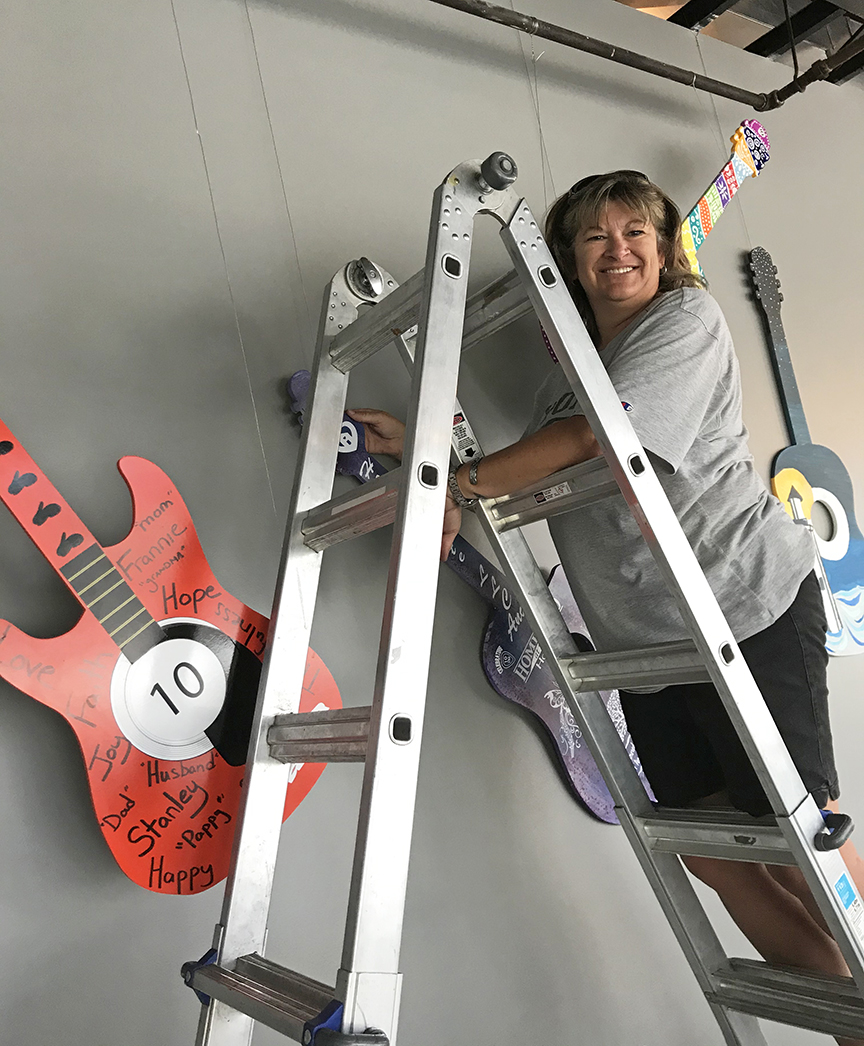 After a temporary pause due to the COVID-19 pandemic, Homeland Hospice is excited to announce its “Guitars … with Gratitude … 2020 Tour” is back on the road. Guitars are currently on display at Café 1500 in Harrisburg and Desperate Times Brewery in Carlisle.
After a temporary pause due to the COVID-19 pandemic, Homeland Hospice is excited to announce its “Guitars … with Gratitude … 2020 Tour” is back on the road. Guitars are currently on display at Café 1500 in Harrisburg and Desperate Times Brewery in Carlisle.
“Guitars, Gifts & Gratitude” was a Homeland Hospice 10th anniversary event held last November featuring local musicians and a guitar gallery with more than 60 art-inspired guitars. The guitars were generously donated and decorated by local individuals and businesses. While each guitar is unique in its design, emotions of hope, compassion and love shine through each piece.
The guitar tour extends the 10th anniversary celebration and provides a platform to share the message of Homeland Hospice. Homeland Hospice is a hospice program that serves communities throughout Central Pennsylvania.
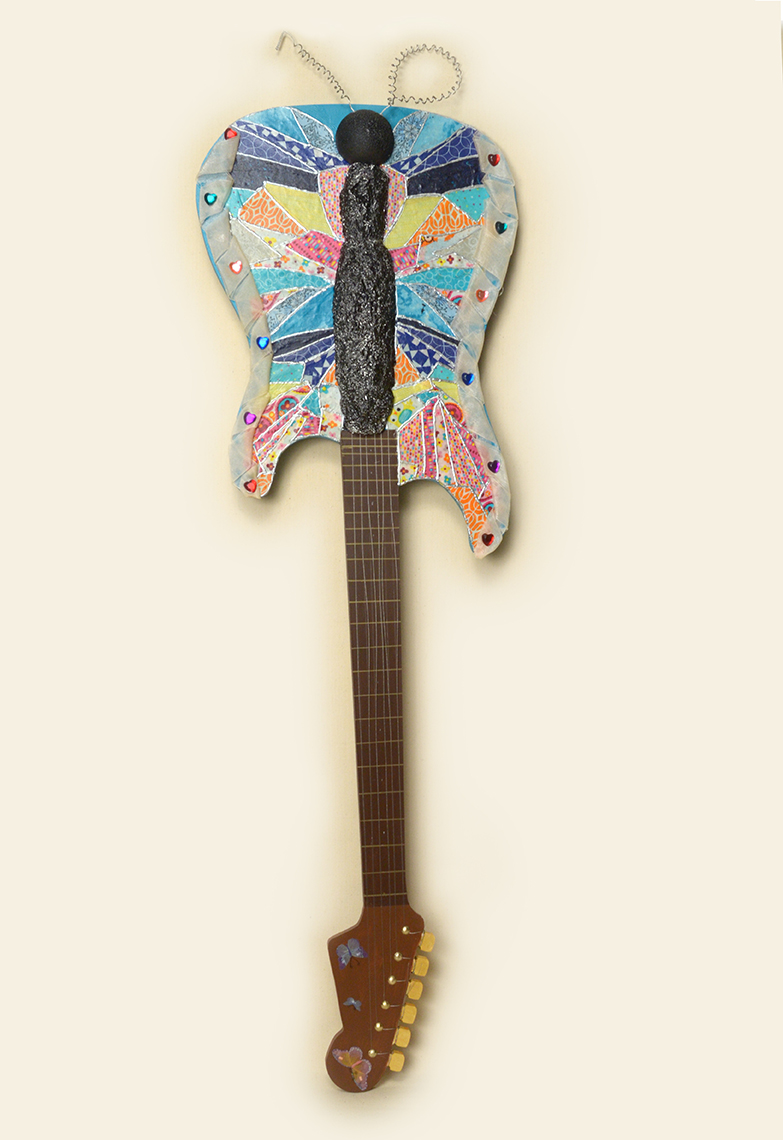 Patrons visiting Desperate Times Brewery can admire Judy Dooley’s butterfly-themed guitar created in honor of her mother Rose, who died more than two years ago. In her end of life journey, Rose received in-home care support including massage and music therapy, and spiritual counseling from Homeland Hospice. The Homeland team also helped Judy as a caregiver and grieving daughter.
Patrons visiting Desperate Times Brewery can admire Judy Dooley’s butterfly-themed guitar created in honor of her mother Rose, who died more than two years ago. In her end of life journey, Rose received in-home care support including massage and music therapy, and spiritual counseling from Homeland Hospice. The Homeland team also helped Judy as a caregiver and grieving daughter.
“The moment I heard about the guitar project, I knew I wanted to be involved,” Judy says. “This project has helped me tell my mother’s story.”
Designing the guitars was not only therapeutic, but an opportunity for individuals to unleash their inner-artists. From local elementary school students and business owners to professional artists, the guitar designers used their talent to showcase their personality. Just like music, the guitars speak to everyone individually while conveying a sense of community.
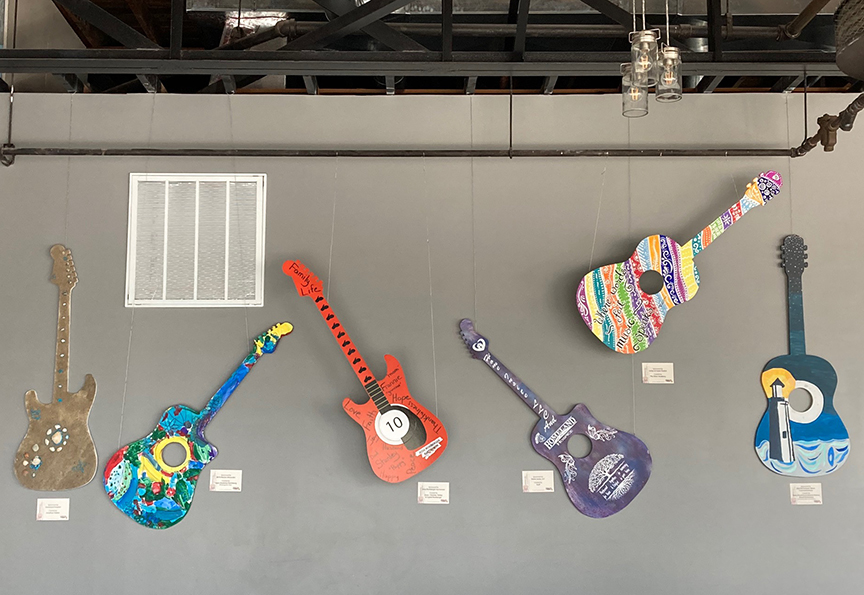 “I knew the designs would be good,” says Ed Savage, Assistant Director of Development for Homeland Center. ”But I was blown away by the creativity. The guitars are outstanding.”
“I knew the designs would be good,” says Ed Savage, Assistant Director of Development for Homeland Center. ”But I was blown away by the creativity. The guitars are outstanding.”
For more information on the guitar tour locations, visit our Guitar Exhibit Locations page.
Homeland Hospice is a hospice program that serves 14 communities throughout Central Pennsylvania by providing end-of-life care either in a person’s home or wherever they reside, including nursing facilities. Homeland also provides bereavement support to families for a full 13 months following the death of their loved one. This service is available to anyone in the community who is experiencing grief.

 Loneliness affects more than 42 million older Americans according to the American Psychological Association. While living alone does not inevitably lead to loneliness, it can be a contributing factor. Social contact typically decreases with age due to retirement, spouse and friends dying or moving away, lack of mobility and physical limitations. When an entire peer group is experiencing these naturally occurring changes it is easy to see why there is a decline in the number and quality of relationships as we age.
Loneliness affects more than 42 million older Americans according to the American Psychological Association. While living alone does not inevitably lead to loneliness, it can be a contributing factor. Social contact typically decreases with age due to retirement, spouse and friends dying or moving away, lack of mobility and physical limitations. When an entire peer group is experiencing these naturally occurring changes it is easy to see why there is a decline in the number and quality of relationships as we age.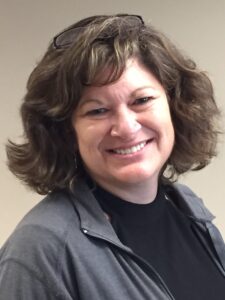
 “There are good things happening in this world,” Laurie says. “Sending cards to patients is a great way to lift their spirits while also enabling people to take part in a positive activity during a difficult time.”
“There are good things happening in this world,” Laurie says. “Sending cards to patients is a great way to lift their spirits while also enabling people to take part in a positive activity during a difficult time.”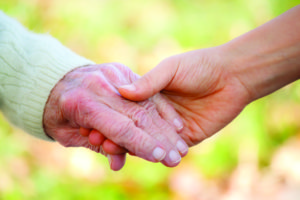 We all need human connections, especially during the journey of grief. A smile or caring embrace from individuals in our support network can provide us courage to share our most intimate feelings of loss, and give us the strength to believe in a better tomorrow. The impact of social distancing because of COVID-19 has compounded the grieving process for individuals and families.
We all need human connections, especially during the journey of grief. A smile or caring embrace from individuals in our support network can provide us courage to share our most intimate feelings of loss, and give us the strength to believe in a better tomorrow. The impact of social distancing because of COVID-19 has compounded the grieving process for individuals and families.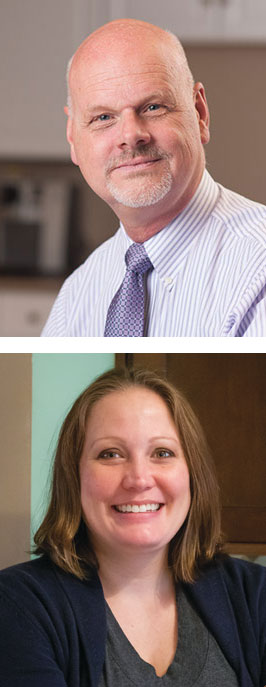 “I’m grateful to Brian Medkeff-Rose and Noelle Valentine, Homeland Hospice’s bereavement counselors,” says Mary Peters, MSW, LSW, Assistant Director of Social Services at Homeland Hospice. “They immediately adapted to phone sessions to offer support and guidance to all of our clients.”
“I’m grateful to Brian Medkeff-Rose and Noelle Valentine, Homeland Hospice’s bereavement counselors,” says Mary Peters, MSW, LSW, Assistant Director of Social Services at Homeland Hospice. “They immediately adapted to phone sessions to offer support and guidance to all of our clients.”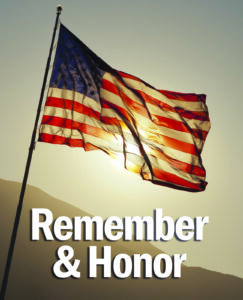 The last Monday in May is recognized as Memorial Day, a special time to remember soldiers lost in wars and conflicts. Small towns hold parades and families come together for picnics. As a country, the president or vice president lays a wreath at Arlington National Cemetery at the Tomb of the Unknown Solider.
The last Monday in May is recognized as Memorial Day, a special time to remember soldiers lost in wars and conflicts. Small towns hold parades and families come together for picnics. As a country, the president or vice president lays a wreath at Arlington National Cemetery at the Tomb of the Unknown Solider.
